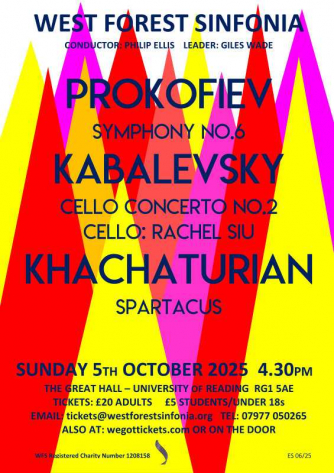Details
Great Hall - Reading University
27 London Rd
Reading
Berkshire
RG1 5AE
England
Programme
Aram Khachaturian – Spartacus
Dmitri Borisovich Kabalevsky – Cello Concerto no.2
~ Interval ~
Sergey Prokofiev – Symphony no.6 in E flat minor, Op.111
Performers
Rachel Siu – cello
Philip Ellis – Conductor
West Forest Sinfonia
Programme Note
The first concert of our 2025/6 season takes place on Sunday October 5th at 4.30pm.
It will be in our usual venue, Reading University Great Hall and will be conducted by our Principal Conductor, Philip Ellis
Aram Khachaturian’s Spartacus is one of the grand ballets of the twentieth century. We will play three movements from the orchestral suites that Khachaturian extracted from the ballet and arranged in 1955. Many will instantly recognise the deeply expressive Adagio of Spartacus and Phrygia, which became familiar to television audiences as the theme of the 1970s BBC show The Onedin Line. This is followed by the Scene and Dance with Crotalums, which draws listeners into the exotic spectacle of the Roman World. The third movement provides excitement with the Dance of the Gaditanae and the Victory of Spartacus where exuberant harmonies and bold, brassy fanfares herald the freed slaves overcoming their Roman captors.
Dmitri Kabalevsky’s Cello Concerto No. 2 is a passionate and demanding work written in the late 1960s for the Soviet virtuoso cellist Daniil Shafran. The concerto has a dark, almost introspective quality, reflecting the turbulent mood of the era. It gives the soloist, Rachel Siu (who recently gave a stunning performance of the Schumann concerto with WFS) a remarkable role: sometimes fiery and virtuosic, at other times lyrical and restrained, always in vivid dialogue with the orchestra.
Prokofiev’s 6th Symphony was written in 1947 in the shadow of both personal illness and the devastating war years. The symphony stands among the composer’s most haunting achievements. The opening movement is stark and restless, with themes that twist between anguish and defiance. A biting scherzo follows, sardonic and sharply rhythmic, before the finale arrives—outwardly brighter, yet troubled beneath the surface.

 Your events at Classical Events
Your events at Classical Events

